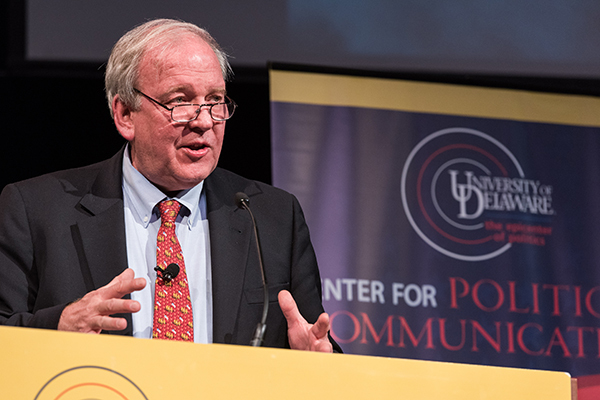Recovering trust : National Agenda 2014: Mike McCurry
Mike McCurry looks at midterm elections, sees need for civil discourse

3:08 p.m., Nov. 13, 2014–Mike McCurry would like to see politicians and voters alike embrace a “golden rule? of civility to restore the spirit of cooperation currently missing from the American political scene.
McCurry, a former White House spokesman and press secretary to President Bill Clinton, discussed the way Americans feel about their country and its elected leaders during a University of Delaware National Agenda speaker series talk given Wednesday evening, Nov. 12, in Mitchell Hall.
McCurry, who also has been a spokesman for the U.S. Department of State and director of communications for the Democratic National Committee, said exit polls from the Nov. 4 elections reveal a sense of uneasiness on important issues at home and abroad.
“This is not a happy country, and certainly not a country happy with its politicians, McCurry said. “It’s a country in which more than two-thirds of the people believe we are headed in the wrong direction, and that we are on the wrong track, and it should suggest to people in Washington, D.C., that they”ve got some work to do to recover the fundamental trust of the American people.”
McCurry describes the election as a dispirited campaign with a level of nastiness and negativity and lack of substance that raises serious concerns given the challenges American faces at home and around the world.
“Obviously, the election marked a changed of leadership in the U.S. Senate,” McCurry said. “This wasn’t necessarily a surprise, because most pundits had predicted that Republicans might regain control of the Senate.”
The surprise, McCurry said, was in the way it happened.
“One way to think about the Senate elections is that the Republicans by and large won the red states, which is probably not that great a surprise,” McCurry said. “Democrats were not successful in holding on in the places were they previously had held.”
In Congress, Republicans won 244 seats, giving it the largest majority since Harry Truman was president.
Republicans also ended up with 31 governorships, and majorities in many state legislatures, McCurry said.
McCurry noted that the makeup of the electorate could be described as “older, whiter and right-er? than the one that that voted in the 2012.
“Blacks made up about 12 percent of the electorate, whites about 75 percent and Hispanics about eight percent, while the share of the vote for the 18-29 year old group went from 19 percent in 2012 to 13 percent in 2014,” McCurry said. “It was not a very hospitable environment for Democrats.”
The 38 percent turnout was one of the lowest in recent midterm election cycles, and those that did vote expressed their concerns in post-election polls, McCurry said.
“Voters far and away thought that the economy was the most important issue at 45 percent,” McCurry said. “Twenty-five percent mentioned health care, 14 percent immigration and 13 percent mentioned foreign policy.”
Voter discontent was also reflected in the fact that while 66 percent said they felt the country is on the wrong track, 64 percent said they were dissatisfied with the condition of the economy and 72 percent worried about terrorist attacks on U.S. soil, McCurry said.
“This is an electorate that did not believe that they were seeing the kind of leadership responsive to the things that give them the greatest fear,” McCurry said.
As for the highly polarized state of the electorate, McCurry said a return to the idea of a “golden rule,” a tenet of several major religions, might help heal the divide and put civility back in American’s political culture.
“If we profess to have some kind of community, and say that we do love our neighbor, we might be able to break down the negativity of the political process,” McCurry said. “Wouldn’t it be great to say in 2016, that we had created a country where every child born would have the opportunity to enjoy life, liberty, and the pursuit of happiness??
McCurry also joined host Ralph Begleiter, director of UD’s Center for Political Communication, to field questions on a number of issues including media coverage and the 2016 national election.
The next presentation in the series, at 7:30 p.m., Wednesday, Nov. 19, also in Mitchell Hall, will be a post-election analysis featuring Stephanie Cutter, deputy campaign manager for President Barack Obama’s 2012 campaign, and UD alumnus Steve Schmidt, an international political strategist and vice president of Edelman, the world’s largest public relations firm.
This year, National Agenda alternates with a political film series, and the final screening will be Thank You for Smoking, at 7:30 p.m., Wednesday, Dec. 3, in Mitchell Hall. This series, “Fade to Black: Dark Political Humor in American Film,” is moderated by Lindsay Hoffman, associate professor of communication.
Article by Jerry Rhodes
Photos by Evan Krape
